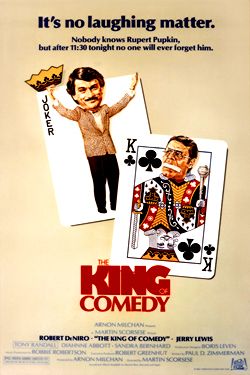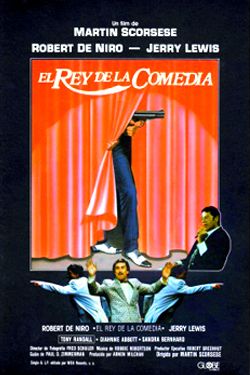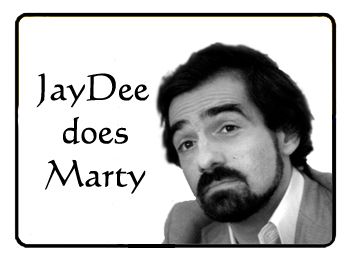← Back to Reviews
in
As I've said before on this forum, and indeed quite recently (at the time of writing), I'm not really a fan of Robert De Niro. When it comes to a lot of his most celebrated performances I personally struggle to really warm to or admire them. There's just something about him in those kind of roles that I cannot connect with. That said however I have to admit that I thought he was really quite fantastic in this film as Rupert Pupkin. I know I'll be alone on this but I prefer when he subverts his gruff, macho image in the likes of Meet the Parents, Analyze This, Silver Linings Playbook, Stardust etc. And this performance certainly falls into that category. It's the performance of a real character actor I felt, creating an individual who is amusing and strangely endearing, but at the same time who is sad and rather unsettling. He really is such a pathetic fellow, dedicating his entire life to his delusional fantasies; fantasies that he indulges in down in his mother's basement and that are frequently interrupted by his mother. He has built his own replica of Jerry's set where he acts out these fantasies alongside cardboard cut-outs of Jerry and Liza Minelli. And he also has a entire wall covered in a print of a cheering audience that he likes to perform in front of. In a way he comes across as the ultimate optimist, completely oblivious to Jerry trying to give him the brush off, convincing himself that they are great friends. He is such a celebrity addict that he knows every single one of his fellow autograph hunters by name. Initially he comes across as a fairly harmless and feeble pest to Jerry; it's only at the half-way point when he is rejected by Jerry that he becomes really dangerous. There really is a very obvious link to De Niro's most famous creation, that of Travis Bickle.
That talk earlier of subverting the image that you're most recognised for leads me nicely onto the other stand-out performance in The King of Comedy, that of Jerry Lewis. Now while I don't believe I have ever actually seen one of his films before, I am well aware of his famous, unique and oft-imitated comic styling; all that childish slapstick and shouts of laaadddyyyy!!! Well there's not a single trace of that persona to be found here in his performance as Jerry Langford. The character seems to be completely worn down and embittered by the level of fame that he has achieved, and I wonder just how close to the truth and to the bone his performance was. The other starring performance is delivered by Sandra Bernhard as Masha, Rupert's fellow Jerry obsessive. In general I can't really stand Bernhard but her screeching, neurotic nature works really well for the character. She is entertaining, downright frightening and aggressively sexual all at the same time. Her attempted seduction of a tied-up Jerry is a spectacularly uncomfortable scene. And it wasn't the only occasion I got that feeling. For me there was a definite Curb Your Enthusiasm vibe to proceeding throughout, with many of the film's laughs being generated out of situations of pure discomfort. The scene in which Rupert and Rita invade Jerry's home under the delusion that Jerry has invited them for the weekend is just brutal to watch. As was the first date that Rupert and Rita went on. Throughout the whole date Rupert is just so spectacularly disingenuous; he is basically just practicing the schtick that he plans to one day use on Jerry's chat show, complete with a rousingly fake showbiz laugh.
Sorry Sexy but we're not done yet
 |
 |
Year of release
1983
1983
Directed by
Martin Scorsese
Martin Scorsese
Written by
Paul D. Zimmerman
Paul D. Zimmerman
Starring
Robert De Niro
Jerry Lewis
Sandra Bernhard
Diahnne Abbott
Shelley Hack
Robert De Niro
Jerry Lewis
Sandra Bernhard
Diahnne Abbott
Shelley Hack
The King of Comedy
-
Plot - Rupert Pupkin (De Niro) is a would be comedian who holds aspirations of greatness; aspirations that have reached the level of obsession. And in particular these obsessions have centred upon his comedy idol, talk show host Jerry Langford (Lewis). When he takes advantage of a situation and initiates a meeting with Jerry, he thinks he has made a real connection that will lead to him appearing on the show and becoming the star he so desperately desires to become. When his advances result in him simply being given the run-around, Rupert's attitudes and ideas take a dark turn. Teaming up with his fellow Jerry-obsessed friend Marsha (Bernhard), he concocts a plan to kidnap Jerry Langford and hold him ransom so that he can finally perform his stand-up routine for the show's millions of viewers.
Ah fame, she is a fickle mistress.
And that really is what this film is about. The great strength of The King of Comedy I felt was certainly to be found in its sharp and witty script. I'm not sure exactly how relevant the story was upon its release in 1983, but I can pretty much guarantee that it is more relevant today than it ever has been at any other time. Thirty years ago the film's central idea may have seemed rather ridiculous and far-fetched, these days however, not so much. While no-one has perhaps matched the actions of Rupert Pupkin in terms of their criminality - actually no that's not quite true is it? There was that television reporter in Brazil who was arrested for organising killings to boost the ratings of his TV show which focused on crime in the country. Well apart from a single rare occasion no-one may have matched the actions of Rupert Pupkin in terms of their criminality, however are some of the things we've seen people do in the quest for fame really all that much more distasteful? With all the reality and 'talent' shows that populate TV schedules these days terms such as 'celebrity' and 'TV star' have been completely b*stardised to the point of almost being an insult.
Rupert's ambitions really are a depressingly spot-on metaphor for the way that many would-be celebrities think these days. He doesn't want to tour the comedy club circuit, he doesn't want to hone his skills and work on his routine, he just wants his opportunity handed to him right now, he wants instant gratification. And that is something that is sadly common in this day and age. After all why should you work hard for years and years to become a great singer or comedian or actor when you can simply release a sex tape, embarrass yourself and your family on a 'reality' show or do something incredibly stupid or disgusting and upload it to youtube? Is there a sadder indictment of our current society that a girl was able to get somewhat famous purely because she ate her own tampon? Oh yeah, and as for everyone getting their 15 minutes of fame no matter how untalented they may be? Well these days that 15 minutes sadly seems to be lasting longer and longer. I just saw an ad on TV earlier promoting seasn 8 of Keeping Up With the Kardashians. Season Eight!!! 

As well as a commentary on fame and the notion of celebrity, The King of Comedy also succeeds as a study in obsession. His very singular goal in life is to be famous, to have millions of people adore him and know his name. It's no accident on that front that Paul D. Zimmerman's script is full of instances of no-one being able to actually get his name right. In his mind he becomes convinced that the way he is going to achieve this level of fame is by appearing on The Jerry Langford Show, and as such he has actually linked his life and his experiences to Jerry himself. The film highlights the level of obsession that people can have for celebrities and the relationship that they can create between them in their mind. There's a great little scene in the film where Jerry is out walking the streets and an elderly woman recognises him, telling him what a big fan of his she is and asking for his autograph. She is using a payphone at the time and asks him to speak to her nephew on the other end of the line who is in hospital. Jerry refuses as he is in a rush, and in the blink of an eye the woman's attitude completely changes. She viciously snaps at him, telling him that he “should only get cancer! I hope you get cancer!” It's a wonderfully insightful snapshot of both the fleeting nature of celebrity and the expectations that the public have of you. Because they watch and support you, they somehow believe that entitles them to something from you. And that's the case with Rupert and Jerry. As a devout fan of his for years Rupert has imagined this friendship between the two men, and has convinced himself that not only will Jerry help him, but that it's his duty to help him. That incident on the street with the woman did actually happen to Jerry Lewis, and was included at Lewis' suggestion.
Film Trivia Snippets - During the scene where Rupert and Rita gatecrash their way into Jerry Langford's country home, Jerry Lewis got a distressing taste of De Niro's method acting style. Before they started filming, De Niro insulted Lewis with various anti-Semitic remarks which greatly angered him. Lewis had never worked with a method actor before and was shocked and appalled at this, but he was still able to deliver an extremely credible performance. /// During the scene where Robert De Niro and Sandra Bernhard argue out on the streets of New York, three of the individuals who heckle them may seem familiar to you. Credited as “street scum” you have Mick Jones, Joe Strummer and Paul Simonon, members of the British punk rock band, The Clash. Scorsese and De Niro were both huge fans of the band and regularly attended their New York shows. /// As well as making a cameo himself, Martin Scorsese made sure that it was a real family affair. His mother Catherine provides the voice of Rupert Pupkin's mother; his father Charles plays one of bar patrons during the scene where Rupert turns the TV on to show Rita he made it on the show; and his daughter Cathy plays a fan asking for Rupert's autograph during one of his fantasies.
Unlike Travis Bickle however I found Rupert Pupkin to be a surprisingly likeable and sympathetic individual, largely because I think we can all identify with the character in a way, no matter how pathetic we may find him. I think we all have these great designs for our life, the majority of which never pan out. And I think we all fantasise about being able to go back and show off to someone in our past about how well we are doing. In Rupert's case we see that in his fantasy about having his Principal telling him about how he and everyone at school was wrong and how Rupert was right. And even though he does eventually turn out to be dangerous, for the large part he seems pretty harmless, even quite pitiful. Even when he has committed his big criminal act he still comes across more often than not as this bumbling, clownish oaf. See the scene for example where he is orchestrating Jerry's phonecall regarding the instructions for getting Rupert on TV; he can't even get that right. We see him clumsily dropping cue cards, putting them in the wrong order, presenting them to Jerry upside down etc; a criminal mastermind he is not. And then in the concluding monologue that he is finally able to present on Jerry's show we perhaps get an insight into just why he has turned out the way he has. While we don't know how much of it is genuine and how much is just for comic reasons, we do get clues of a dark past that included bullying and a tough childhood. And there's one single line that perhaps explains his whole way of thought; “That was the only attention my father ever gave me.” As I said we don't know how much truth there is in this, but perhaps it is a little insight into why he has become so obsessed with fame, why he has become so fixated with getting as many people as possible to pay attention to him and what he has to say.
Film Trivia Snippets - Before Martin Scorsese signed on to the project Milos Forman had been interested in directing. He dropped out of contention however when he was hired to direct One Flew Over the Cuckoo's Nest. When it came to casting the role of Jerry Langford several big names were considered. These included Johnny Carson, Frank Sinatra, Dean Martin, Sammy Davis Jr., Joey Bishop and Orson Welles. Johnny Carson was the only one to actually be offered the role before Jerry Lewis, but he turned it down. /// Martin Scorsese said later that making this film was an "unsettling" experience, in part because of the embarrassing, bitter material of the script. Scorsese said that he and De Niro may not have worked together again for seven years as a result of how emotionally gruelling it was to make this film. He has also said that he thought De Niro's turn as Rupert Pupkin was De Niro's best performance under his direction. /// The original script for the film was actually written by Paul D. Zimmerman all the way back in the late-1960s. At the time of writing it he had Dick Cavett in mind for the role of the talk show host. /// Before Sandra Bernhard was cast in the role of Masha, the part had been offered to Meryl Streep but she turned it down.
I'm not going to claim that I'm now an expert on the works of Martin Scorsese just because of this little marathon of late. Based on what I have seen however I'd say that The King of Comedy is the least obviously Scorsese-ish (Scorsese-ian?) of his films. While thematically you can link the story and its characters to his other films, most notably Taxi Driver, his customary visual flair and creativity are pretty much completely absent. In fact it's so simple and plain-looking that you could argue it more closely resembles a television show than a film. Given Rupert Pupkin's obsession with appearing on TV's Jerry Langford Show I wonder if this was a deliberate move on the part of Scorsese, or perhaps I'm looking too deeply into it and giving Marty too much credit.
Then there's the film's ending which sees Rupert realise the fame he has sought with such demented desire, even if it's fame born out of notoriety more than actual talent. This closing sequence does however present the question of whether it is real or not. Throughout the film we saw Rupert indulging in his delusional fantasies about how great his life was going to turn out when he became famous. It's very easy to imagine this as another of those fantasies, that Rupert is sitting in his cell and this is all in his head. If however it's supposed to be genuine then it's Scorsese's withering attack on the cult of celebrity and what we as a society actually respond to. Or perhaps it's both.
Conclusion - The King of Comedy is a razor-sharp satire and black comedy that sets its sights on celebrity adoration, obsession and mental health. With an excellent script and a terrific performance from Robert De Niro at its core, this is a pretty great flick. If I were just honestly assessing this film on its own merits it may too have gotten a straight rating. The fact that I didn't take to it quite as much as Hugo however made me feel that I should throw a minus in there just to reflect that.

